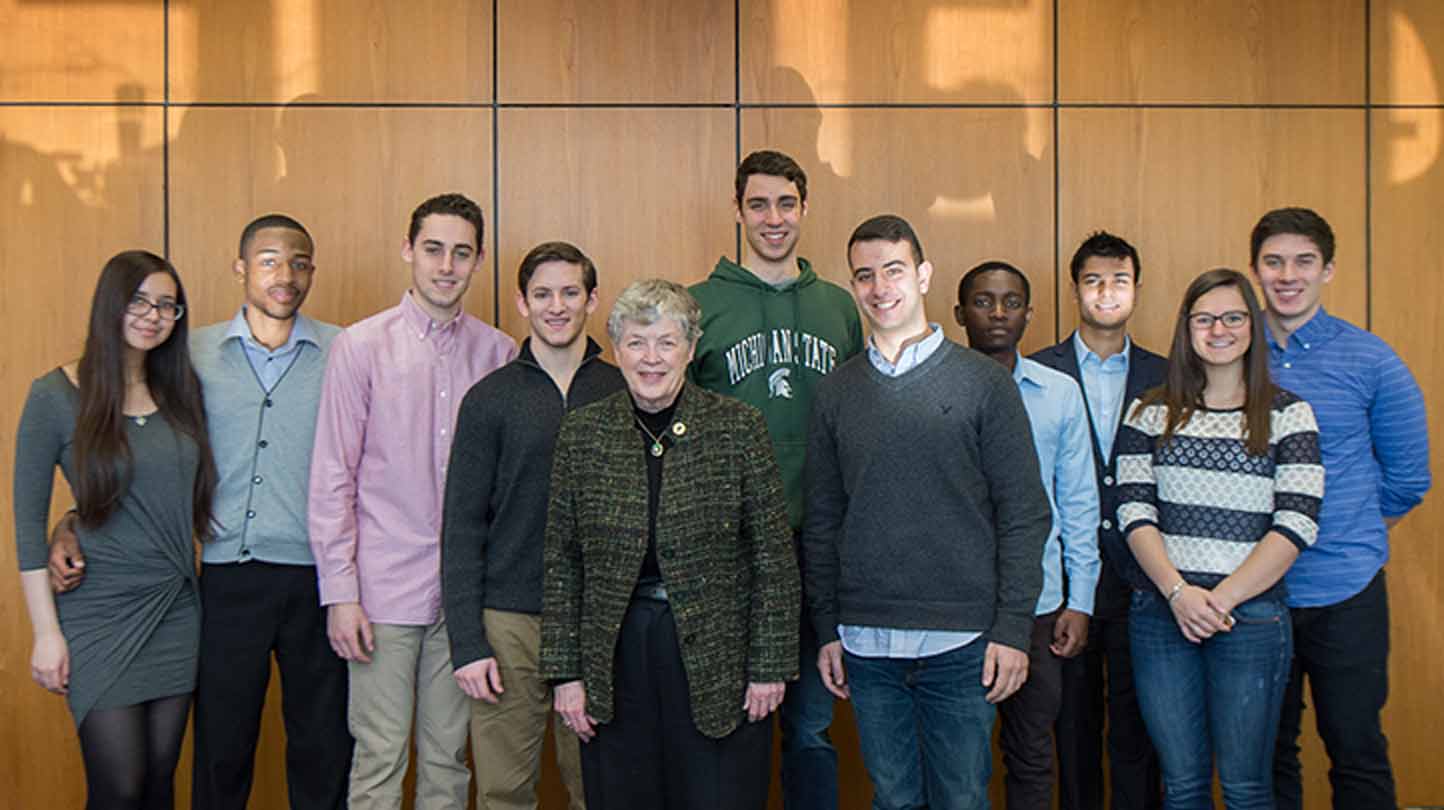Land-grant Leadership

The 20th president of Michigan State University, Lou Anna K. Simon engaged the university in a strategic and transformative journey that adapted the principles of its land-grant heritage to meet 21st-century challenges. For more than a decade, she led MSU in its ongoing commitment to advancing the common good with uncommon will.
Growth and Impact
Under Simon’s leadership, Michigan State, which ranks among the top 100 global research universities, grew in enrollment, external research funding, and private giving, while expanding its impact on communities across Michigan and around the world.
Simon initiated institutional efforts that have increased undergraduate student success while also advancing world-leading research and graduate programs that rank among the nation’s best.
Signature accomplishments include MSU’s $1.5 billion Empower Extraordinary capital campaign, which surpassed its fundraising goal more than a year ahead of schedule, and the university’s Global Impact Initiative, which has resulted in the hiring of more than 70 new faculty members on its way to adding 100 faculty in research areas in which MSU can make the most important contributions.
Simon was a driving force in the university’s successful pursuit of the $730 million Facility for Rare Isotope Beams, a national user facility funded by the U.S. Department of Energy Office of Science, MSU, and the State of Michigan, which is scheduled for completion in 2022. In addition, her collaboration with alumnus and philanthropist Eli Broad fostered creation of the Eli and Edythe Broad Art Museum, designed by world-renowned architect Zaha Hadid.
A leader among her higher education peers, Simon also has been a strong advocate for public and research universities and is a past chair and board member of the Association of American Universities, a group of 62 leading U.S. and Canadian research universities.
Land-grant Mission
Simon’s leadership reflected her belief that all efforts to excel must incorporate the university’s land-grant mission, an imperative to engage with the world in ways that meet the needs of society and to remain accessible.
The nation’s pioneer land-grant institution, Michigan State was born in the mid-19th century as a bold experiment that created a new model for democratization of both opportunity and the knowledge generated by higher education. Simon often challenged faculty and staff to visualize what such a purpose-built institution would look like today and urged them to keep building it at MSU.
From the beginning of her tenure, Simon defined Michigan State’s core land-grant values as quality, inclusiveness, and connectivity, each value lending support and meaning to the others.
A steadfast supporter of institutional diversity, Simon defined inclusion at MSU to mean providing all who live, learn, and work at the university the opportunity to actively participate in a vibrant, intellectual community that offers a broad range of ideas and perspectives.
The outreach component of the land-grant university mission thrived under Simon’s influence—from enduring partnerships in Detroit to long-term collaborative research in Africa. Working with other universities and communities is a priority for faculty, and MSU has been recognized nationally for its contributions to the public good, including undergraduate participation in service, research, internships, and education abroad.
Team MSU: Leader and Member
Simon’s leadership reflected her personal style of engagement as well as her early influences. Throughout her time as president, she remained conscious of her rural Indiana roots, crediting her parents for not allowing the gender barriers of the day to limit her horizons. The first in her family to attend college, she also was selected as the first female provost in the Big Ten and the first woman to lead MSU as president.
Simon valued interacting with students as well as alumni, whether discussing concerns at student government meetings or seeking feedback informally while dining in residence halls. She was a familiar presence at campus events, greeting new students and their families during fall move-ins, marching with the campus community at Martin Luther King, Jr. Day celebrations, and accompanying the Spartan Marching Band to the stadium on game days.
A former member of the National Collegiate Athletics Association Division I board of directors, Simon is an avid sports fan and often attended MSU athletic events. Her tenure was marked by success in a number of MSU sports programs, notably men’s basketball under Hall of Fame head coach Tom Izzo and a resurgent football program under head coach Mark Dantonio, as well as three national championships: men’s basketball in 2000, men’s ice hockey in 2007, and women’s cross country in 2014.
Simon, with her husband, Roy J. Simon, is a longtime financial supporter of the university. The Simons are members of MSU’s Clifton R. Wharton Donor Recognition Society, which recognizes donors who make a commitment of at least $2,500,000 to MSU or a qualifying deferred gift of at least $3,750,000.

